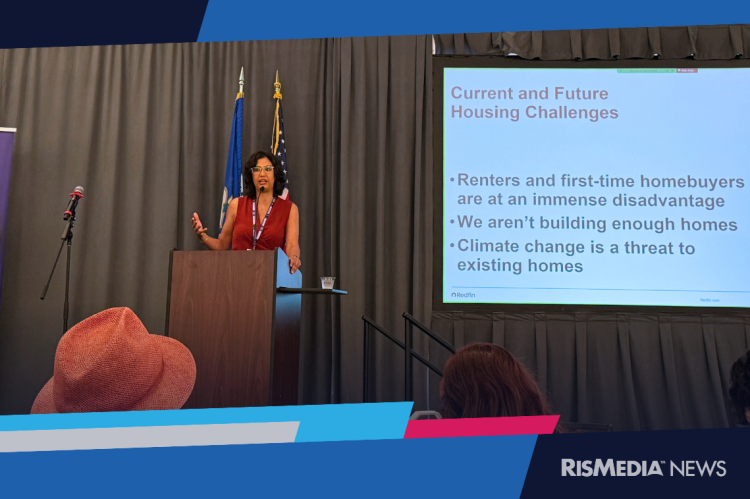Above, Daryl Fairweather at the YIMBYtown conference in New Haven, Connecticut on Sept. 14.
NEW HAVEN, CT — Kicking off YIMBYtown 2025, Redfin Chief Economist Daryl Fairweather delivered a keynote speech to attendees Sunday morning at the “Yes In My Backyard” (YIMBY) pro-homes conference for advocates, organizers and policymakers.
Drilling down on housing affordability, Fairweather explained that “this year was the first year in a very long time that we have seen a decline in homeownership.” The same is true for first-time homebuyers, which dropped to a record low of 24% of homebuyers last year, she added.
“It’s getting harder and harder to break into homeownership in this country,” Fairweather told the audience of self-described “YIMBYs.”
The YIMBY movement, which has roots in Northern California and became more formalized with the first YIMBY Town conference in 2016, seeks to address a lack of homes by supporting building and development through a policy at every level of government, as well as through non-governmental vectors.
YIMBYs generally advocate for less restrictive land use law and governmental support for residential development in their communities—as opposed to “NIMBYs” (Not In My Backyard), who may be generally supportive of housing but oppose development in their towns or neighborhoods.
Fairweather’s talk focused largely on barriers that are preventing many people from achieving homeownership. The reason we should care about the decline in homeownership, according to Fairweather, is that this country has an “enormous wealth gap between people who are homeowners and people who are renters.”
“Now, obviously, you know, you have to have enough wealth to become a homeowner, so there’s some correlation there; it’s not all causation. But, still, there’s this huge gap,” she said. “A lot of this wealth is because homeowners are gaining equity in their homes, and they are gaining wealth.”
This increase in equity has been something that people could rely on for a while now, but this year, home equity has started to decline. It’s no longer as reliable that homeowner equity will continue to increase, she added.
“This comes back to affordability, really,” she said. “The reason that there are so few first-time homebuyers in the market is because it’s just become unaffordable to buy a home.”
Before the pandemic, people could still buy a home on a median income without spending more than 30% of their income, Fairweather detailed. Now, nationwide data is showing that median-income households need to spend 38% of their income, leaving them cost-burdened.
Young people, especially, are feeling the pain of this, Fairweather added. Since many jobs are located in coastal metros, most young people face the decision of living somewhere with unaffordable housing but an easier time finding a job, or living in an affordable area where they will not earn as much, which puts people starting their careers in a tough position.
Recent reports from the National Association of Realtors® have shown that people are taking longer to buy their first home, with the average age of first-time homebuyers reaching an all-time high of 38.
The biggest challenges in the housing market today are that renters and first-time homebuyers are at a huge disadvantage compared to existing homeowners, Fairweather told the YIMBYtown audience.
“Existing homeowners already have this wealth; they have these tax benefits. They kind of constructed the tax system and economy around them to benefit them, and that’s been to the detriment of renters and first-time homebuyers,” she said. “We just aren’t building enough homes to solve this problem.”
On the bright side, shared Fairweather, housing is a bipartisan issue.
“Both Democrats and Republicans say that they are for policies that promote building more housing,” she said. “It’s not a ‘Left’ issue; it’s not a ‘Right’ issue. It’s an affordability issue.”












